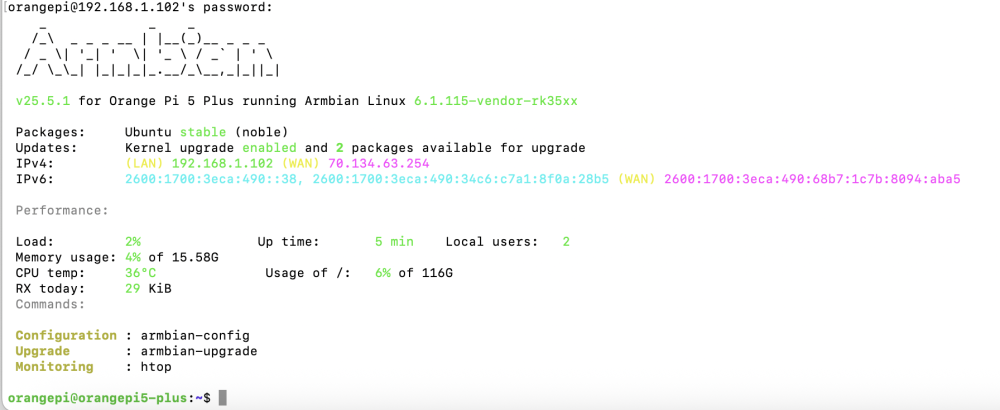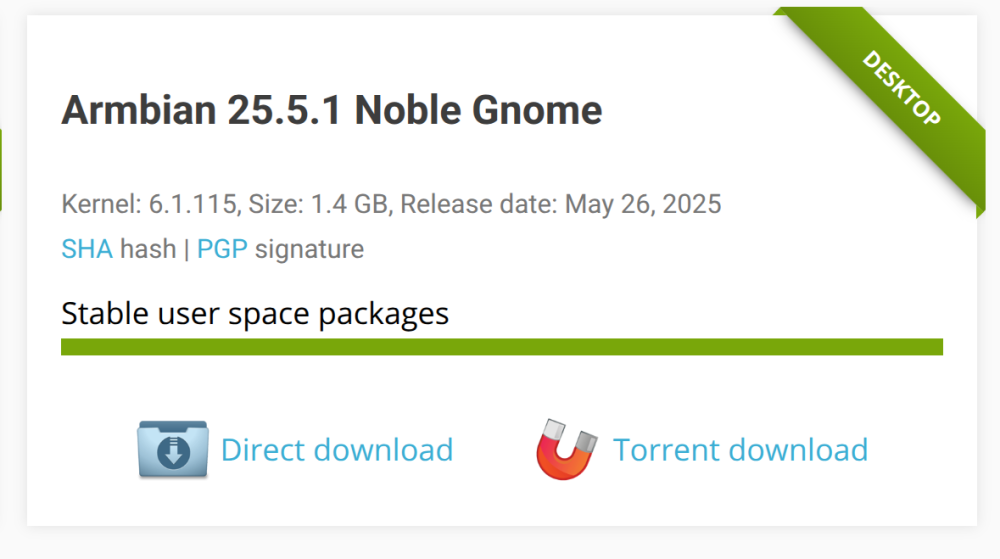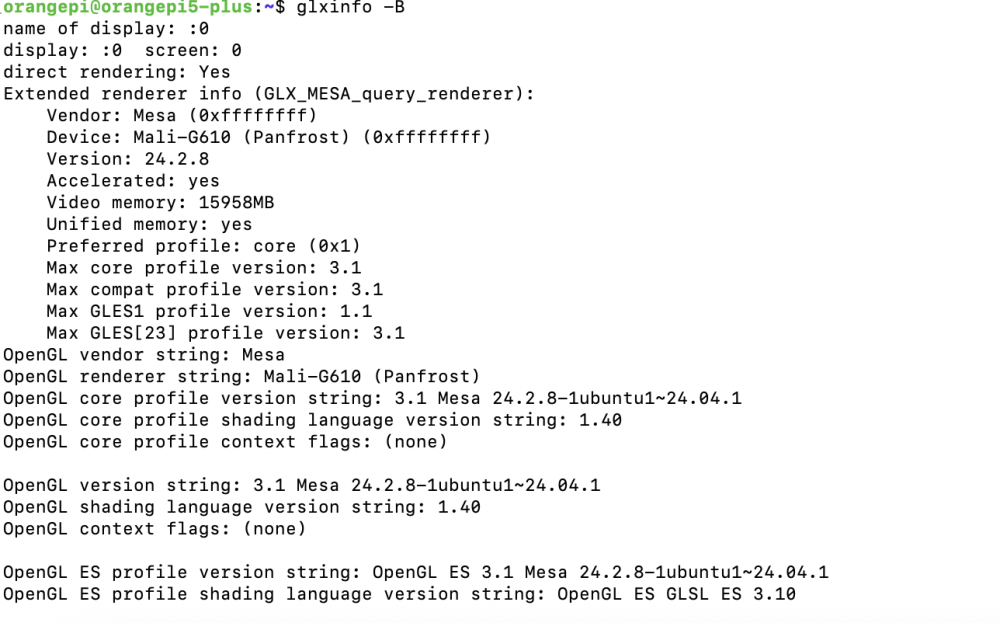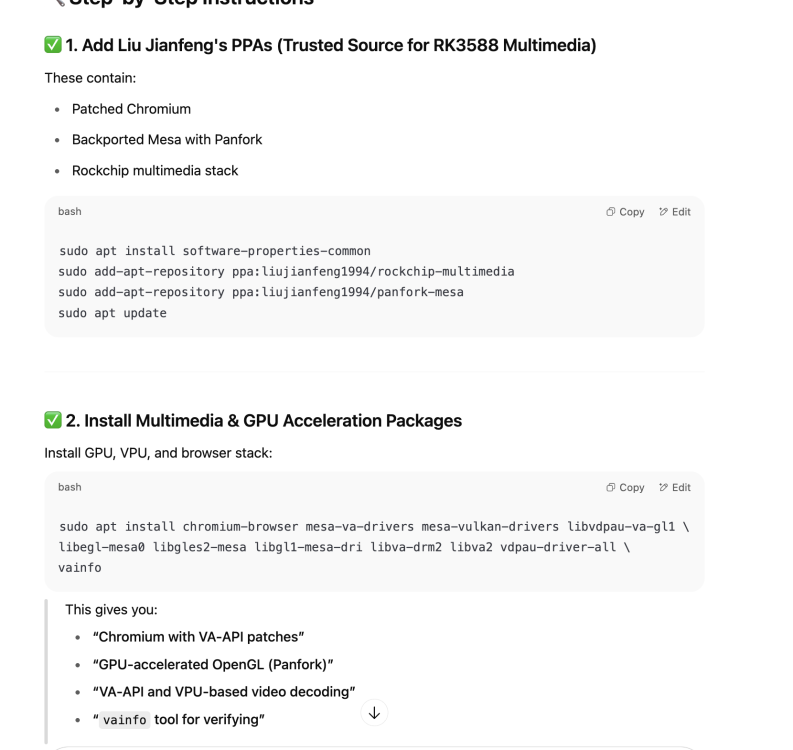All Activity
- Past hour
-
As @Werner said and then just ask any specific questions you may have. Welcome to the Armbian community, @Sahil Usmani.
-
Seriously? https://www.lmgt.org/?q=simulate+high+latency https://duckduckgo.com/?q=simulate+high+latency You're welcome. "Many many months" of what?
-
I've started using an MXQ-4K box as a file server, but writing files over the network is slow, with speeds in the 3-5 MB/s range. Reads cap out at the fast ethernet link speed (~11 MB/s). I don't believe there's a CPU, disc, or RAM bottleneck as the speeds are the same regardless of file size or transfer protocol as SMB, FTP, and WebDAV all give me the same speeds, and checking in htop, they are never at 100%. These speeds are also observed when downloading a file from another device on the local network using wget or aria2 while sshed into it, with faster speeds on other devices. As far as I can tell, iostat doesn't suggest high io wait times are the culprit. If it matters, I'm writing to an external USB HDD, but the write speeds are the same when writing to the SD card through the network, which makes me believe this is not an issue. If I write a ~1.0GB file using dd to the HDD while sshed into it with `dd if=/dev/random of=/mnt/disk/tmp.bin bs=64k count=16500 conv=fdatasync`, it gives a local disk speed of ~20 MB/s, which is more than enough to saturate the 100 mbps link. Has anyone else experienced similar results? Are the slow network speeds just a limitation of the onboard nic/hardware? I'm open to suggestions.
-
You are asking for help. Have you actually followed the guidance you were given, though? Have you been successful to compile an image for any target (virtual or otherwise)?
- Today
-
@Sandeep Please don't hijack / necro old threads. You have a completely different issue from the OP, this particular one was already solved. Please open a new thread and show the output of "cat /etc/apt/sources.list /etc/apt/sources.list.d/*.{list,sources}". Feel free to ping me there and I'll be happy to help.
-

labwc (wayland) crashes on exit
laibsch replied to robertoj's topic in Software, Applications, Userspace
OK, what does that leave us with? You tried an armbian image with armbian and debian kernel and binaries and get a kernel oops. Then you tried an Armbian image with Armbian kernel and Debian userland but a self-compiled labwc and you do not get the crash? Summary so far correct? - Yesterday
-
You can find the dram config options here. https://elixir.bootlin.com/u-boot/v2025.07-rc2/source/arch/arm/mach-sunxi/Kconfig if DRAM_SUN50I_H616 config DRAM_SUNXI_DX_ODT hex "DRAM DX ODT parameter" help DX ODT value from vendor DRAM settings. config DRAM_SUNXI_DX_DRI hex "DRAM DX DRI parameter" help DX DRI value from vendor DRAM settings. config DRAM_SUNXI_CA_DRI hex "DRAM CA DRI parameter" help CA DRI value from vendor DRAM settings. config DRAM_SUNXI_ODT_EN hex "DRAM ODT EN parameter" default 0x1 help ODT EN value from vendor DRAM settings. config DRAM_SUNXI_TPR0 hex "DRAM TPR0 parameter" default 0x0 help TPR0 value from vendor DRAM settings. config DRAM_SUNXI_TPR2 hex "DRAM TPR2 parameter" default 0x0 help TPR2 value from vendor DRAM settings. config DRAM_SUNXI_TPR6 hex "DRAM TPR6 parameter" default 0x3300c080 help TPR6 value from vendor DRAM settings. config DRAM_SUNXI_TPR10 hex "DRAM TPR10 parameter" help TPR10 value from vendor DRAM settings. It tells which features should be configured, like write leveling, read calibration, etc. config DRAM_SUNXI_TPR11 hex "DRAM TPR11 parameter" default 0x0 help TPR11 value from vendor DRAM settings. config DRAM_SUNXI_TPR12 hex "DRAM TPR12 parameter" default 0x0 help TPR12 value from vendor DRAM settings.
-

labwc (wayland) crashes on exit
robertoj replied to robertoj's topic in Software, Applications, Userspace
I didn't try to replicate the problem in x86... but I compiled the latest labwc 0.9.0, in Orange Pi Zero 3 with Bookworm, and this problem does not show up -
after last rolling update wifi has gone... but bluetooth is fine... apt list --upgradable armbian-bsp-cli-bananapim4zero-current/noble 25.8.0-trunk.442 arm64 [upgradable from: 25.8.0-trunk.428] armbian-firmware/noble,noble 25.8.0-trunk.442 all [upgradable from: 25.8.0-trunk.428] .... linux-dtb-current-sunxi64/noble 25.8.0-trunk.442 arm64 [upgradable from: 25.8.0-trunk.428] linux-image-current-sunxi64/noble 25.8.0-trunk.442 arm64 [upgradable from: 25.8.0-trunk.428] how to fix this?
-
Ok, just used adb pull /proc/device-tree and used dtc and got this dts. This should be a complete dts. dts.txt
-
Yeah with the full dump it is essentially the same as boot.img. Manual testing it is.
-
Auy idea why my electron app crashes running on branch edge release noble custom build with below error [2440:0730/102955.112990:ERROR:cert_issuer_source_aia.cc(35)] Error parsing cert retrieved from AIA (as DER): ERROR: Failed parsing Certificate SEQUENCE ERROR: Failed parsing Certificate [2510:0730/102955.113685:ERROR:ssl_client_socket_impl.cc(877)] handshake failed; returned -1, SSL error code 1, net_error -202 [2440:0730/104601.001405:ERROR:network_service_instance_impl.cc(612)] Network service crashed, restarting service. [2440:0730/104601.014376:ERROR:zygote_communication_linux.cc(296)] Failed to send GetTerminationStatus message to zygote [2440:0730/104601.020244:ERROR:zygote_communication_linux.cc(296)] Failed to send GetTerminationStatus message to zygote [2440:0730/104601.041426:ERROR:gpu_process_host.cc(947)] GPU process launch failed: error_code=1002 [2440:0730/104601.042506:ERROR:gpu_process_host.cc(947)] GPU process launch failed: error_code=1002 [2440:0730/104601.043109:ERROR:gpu_process_host.cc(947)] GPU process launch failed: error_code=1002 [2440:0730/104601.043662:ERROR:gpu_process_host.cc(947)] GPU process launch failed: error_code=1002 [2440:0730/104601.044196:ERROR:gpu_process_host.cc(947)] GPU process launch failed: error_code=1002 [2440:0730/104601.045030:ERROR:gpu_process_host.cc(947)] GPU process launch failed: error_code=1002 [2440:0730/104601.046123:ERROR:gpu_process_host.cc(947)] GPU process launch failed: error_code=1002 [2440:0730/104601.046765:ERROR:gpu_process_host.cc(947)] GPU process launch failed: error_code=1002 [2440:0730/104601.047349:ERROR:gpu_process_host.cc(947)] GPU process launch failed: error_code=1002 [2440:0730/104601.047374:FATAL:gpu_data_manager_impl_private.cc(420)] GPU process isn't usable. Goodbye.
-
Knowing this means your options are to return the case+NVMe back to shop. Or do a cross-check; case with other NVME and NVME in M.2 slot of some other computer. But this is a typical Raspberry problem; storage via USB (SATA or NVME nowadays) easily leads to trouble. Mostly power related, but also many just the chipset in the adaptor. In case of Pi5, you could get an NVMe adaptor board, but also that is not always working out-of-the box. Only if you buy RPi adaptor and RPI NVME it should work out-of-the-box. Or other SBC that has M.2 slot already on the board.
-
@Werner Thanks let me try that But not sure why I hear that sound (check audio clip) and why screen os not full screen when OS loads. even if I disable the sound I still can here this weird sound. Thanks Manish Audio Clip (2025-07-30 10_47_47).m4a
-
Since about four weeks we encounter out of memory issues when building an Armbian image on GitHub with a customize-image.sh script. We had no big modifications on the build system since then, we have to rebuild from time to time to get the latest version of our application into the image. We already use a more powerful runner (32GB RAM, 8 cores). Our compile call: ./compile.sh \ BOARD=rockpi-4b \ BRANCH=edge \ RELEASE=bookworm \ KERNEL_CONFIGURE=no \ BUILD_MINIMAL=yes \ NETWORKING_STACK="network-manager" \ COMPRESS_OUTPUTIMAGE=xz \ KERNEL_BTF=no \ SHARE_LOG=yes Our build is based on the tag v25.8.0-trunk.260 Any ideas for this? Thanks in advance Florian
-
I did download it and burn a SD with it found it does have HDMI and Mali/Panfrost, which support Hardware acceleration, but it is make some weird noise as I started configuration. Not sure what is that So not sure why I need to patch it
-
./compile.sh BOARD=orangepi5-plus BRANCH=vendor RELEASE=noble ENABLE_EXTENSIONS=mesa-vpu or something like that for an image with this extension built-in. There is no method to install this on a existing system (yet).
-
Hi @Alex T Indeed the board seems to be dead not getting turned on at all. Even tried to boot with the secondary BIOS but not working. I managed to fit the new board in the older case so its perfectly being utilised.
-
Hi @orb First hing I thought the same if there is an issue with battery and unplugged it and tried turning on unfortunately no luck. Anyways, was not able to access my data hence move to another board and successfully restored all my data. But would love to revive this board.
-
Hmm, I tried running it on both mmcblk0boot* and got no output. I'll try running it on the full dump with -a to see if anything comes up. I'll try adding it to the config and go from there, see if it works. I'm not familiar with memory config and a lot of this stuff, but I am trying to learn all kinds of low level stuff and welcome the challenge!
-
@Igor: Hi Thanks for the response. I did get what you mean when you said "Vendor kernel 6.1.y with mesa-vpu extension https://github.com/armbian/os/blob/main/userpatches/targets-extensions.map#L58 (with patched Chromium) " Because I did try Above and I guess it is lacking either HDMI or GPU requirement. I will again test it. but now sure what you mean about extension. Do I need try to build that kernel version? Is below what you mean (from chat gpt) 🛠️ Option 1: Easiest Path — Use Prebuilt Stable Image Use this image (you already have it or download from Armbian): ✅ Armbian_25.5.1_Orangepi5-plus_bookworm_vendor_6.1.115_cinnamon-backported-mesa_desktop.img.xz Then, add the patched Chromium + mesa-vpu extension manually (I'll show you how in a moment).
-
@amazingfate can tell that. https://github.com/armbian/build/blob/main/config/boards/oneplus-kebab.conf#L3
-
You may examine this, diskpart, gfdisk, cfdisk, et.al., even is the cable connection clean? You may consider to check with raspianOS, as it is the best OS supporting rpi5.
-
I've successfully setup Armbian with home assistant preinstalled The image build command is ./compile.sh BOARD="rk3318-box" BRANCH=edge RELEASE=bookworm ENABLE_EXTENSIONS="ha" KERNEL_CONFIGURE="no" BUILD_MINIMAL="yes" I build on edge branch because only kernel after 6.15 can boot on rk3318 tv box, at this time it's 6.16.0rc3 Don't forget to add docker-ce and home assistant extension files to userpatches/extensions folder. After installation you need to cchange internet adapter manager from "Networking" to "Internet Manager" nmcli device set eth0 managed yes This is my prebuild version, use it at your own risk cause everyone on the internet might be the bad guy that want to hack your machine👻 Armbian-unofficial_25.08.0-trunk_Rk3318-box_bookworm_edge_6.16.0-rc3_minimal.img sha file attached Armbian-unofficial_25.08.0-trunk_Rk3318-box_bookworm_edge_6.16.0-rc3-homeassistant_minimal.img.txt Armbian-unofficial_25.08.0-trunk_Rk3318-box_bookworm_edge_6.16.0-rc3-homeassistant_minimal.img.sha
-
Hi, i have ordered complete new Hardware: - Raspberry 5 with 2GB, - USB-C NVME Case with RTL9201 chip and - NVME M.2 SSD: Kingspec NE-128 2280 with 128GB If I attached the M2 Case the SSD will not be detected (sda1) also not on an other PC. So now I don't know, what is defect (Case or SSD). I checked the Setting of the SSD in the case several times. Is there anything else, that I can do? Here some Logs: dmesg: [ 396.031067] usb 1-1: new high-speed USB device number 2 using xhci-hcd [ 396.175568] usb 1-1: New USB device found, idVendor=0bda, idProduct=9201, bcdDevice=f2.00 [ 396.175575] usb 1-1: New USB device strings: Mfr=1, Product=2, SerialNumber=3 [ 396.175579] usb 1-1: Product: RTL9201 [ 396.175583] usb 1-1: Manufacturer: Realtek [ 396.175586] usb 1-1: SerialNumber: 012345678999 [ 396.199296] usb-storage 1-1:1.0: USB Mass Storage device detected [ 396.203540] scsi host0: usb-storage 1-1:1.0 [ 397.222330] scsi 0:0:0:0: Direct-Access Realtek RTL9201 1.02 PQ: 0 ANSI: 6 [ 397.229650] sd 0:0:0:0: Attached scsi generic sg0 type 0 [ 397.234647] sd 0:0:0:0: [sda] Read Capacity(10) failed: Result: hostbyte=0x00 driverbyte=DRIVER_OK [ 397.234654] sd 0:0:0:0: [sda] Sense Key : 0x5 [current] [ 397.234659] sd 0:0:0:0: [sda] ASC=0x24 ASCQ=0x0 [ 397.235968] sd 0:0:0:0: [sda] 0 512-byte logical blocks: (0 B/0 B) [ 397.235974] sd 0:0:0:0: [sda] 0-byte physical blocks [ 397.237121] sd 0:0:0:0: [sda] Write Protect is off [ 397.237125] sd 0:0:0:0: [sda] Mode Sense: 37 00 00 08 [ 397.238266] sd 0:0:0:0: [sda] Write cache: disabled, read cache: enabled, doesn't support DPO or FUA [ 397.238589] sd 0:0:0:0: [sda] Attached SCSI disk lsusb -t: /: Bus 001.Port 001: Dev 001, Class=root_hub, Driver=xhci-hcd/2p, 480M |__ Port 001: Dev 002, If 0, Class=Mass Storage, Driver=usb-storage, 480M /: Bus 002.Port 001: Dev 001, Class=root_hub, Driver=xhci-hcd/1p, 5000M /: Bus 003.Port 001: Dev 001, Class=root_hub, Driver=xhci-hcd/2p, 480M |__ Port 002: Dev 002, If 0, Class=Human Interface Device, Driver=usbhid, 1.5M |__ Port 002: Dev 002, If 1, Class=Human Interface Device, Driver=usbhid, 1.5M /: Bus 004.Port 001: Dev 001, Class=root_hub, Driver=xhci-hcd/1p, 5000M lsblk: NAME MAJ:MIN RM SIZE RO TYPE MOUNTPOINTS sda 8:0 0 0B 0 disk mmcblk0 179:0 0 29G 0 disk ├─mmcblk0p1 179:1 0 256M 0 part /boot/firmware └─mmcblk0p2 179:2 0 28,4G 0 part /var/log.hdd / zram0 253:0 0 1,9G 0 disk [SWAP] zram1 253:1 0 50M 0 disk /var/log zram2 253:2 0 0B 0 disk Is there anything else, that I can do? Or should I ship back SSD and USB Case both? Regards Christian


.thumb.jpg.59cba04974b8104129849d2dd7baeeb4.jpg)






